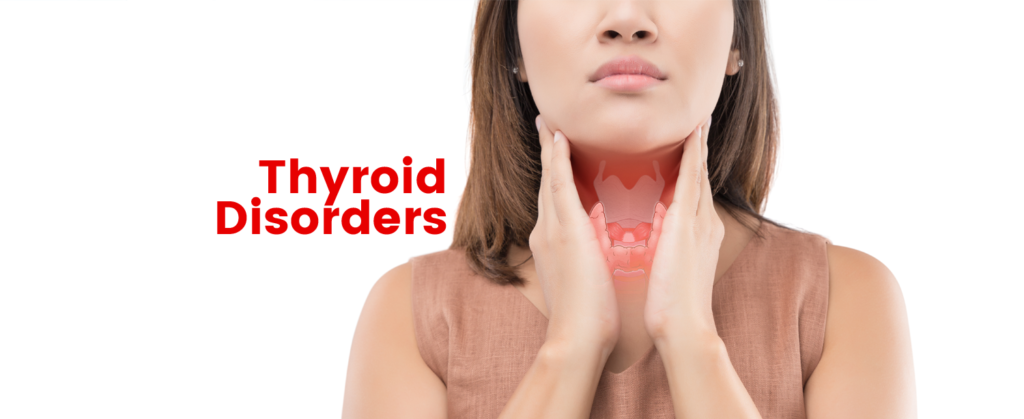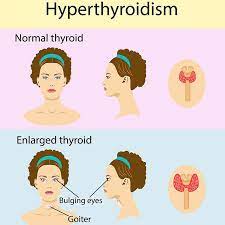
Welcome to our comprehensive guide on thyroid disease. In this article, we will delve into the various aspects of thyroid disorders, including their types, causes, symptoms, diagnosis, and treatment options. Whether you’re looking for information on a specific thyroid condition or want to better understand thyroid health in general, this guide has you covered.
What is the thyroid?
To delve into the intricacies of thyroid disease, we must first comprehend the thyroid gland itself. The thyroid is an essential part of the endocrine system, a network of glands responsible for producing hormones that regulate numerous physiological functions. This small but mighty gland primarily produces two key hormones: thyroxine (T4) and triiodothyronine (T3)
What does the thyroid do?
The thyroid hormones, triiodothyronine(T3) and thyroxine (T4) are the metabolic maestros that choreograph the body’s metabolism. Metabolism, in this context, refers to the process by which our bodies convert the food we consume into energy. However, the thyroid hormones’ reach extends far beyond metabolism; they also influence heart rate, body temperature, and the operation of vital organs such as the heart, brain, liver, and kidneys.
What Is Thyroid Disease?
The thyroid is a small, butterfly-shaped gland located in the neck that plays a crucial role in regulating various bodily functions. Thyroid disease refers to any condition that affects the normal functioning of the thyroid gland, leading to an imbalance in hormone production. This imbalance can have a significant impact on your overall health.
Who is affected by thyroid disease?
Thyroid disease doesn’t discriminate based on age or gender; it can affect anyone, from infants to the elderly. However, women are more prone to thyroid disorders, particularly during life stages such as pregnancy and menopause. Genetics, environmental factors, and certain medical conditions can also heighten an individual’s susceptibility to thyroid disease. Thyroid disease doesn’t discriminate based on age or gender; it can affect anyone, from infants to the elderly. However, women are more prone to thyroid disorders, particularly during life stages such as pregnancy and menopause. Genetics, environmental factors, and certain medical conditions can also heighten an individual’s susceptibility to thyroid disease.
Is thyroid Disease a serious problem?
The seriousness of thyroid disease hinges on various factors, including the specific type of thyroid disorder, its duration, and how effectively it is managed. When left untreated, thyroid disease can lead to significant health issues, impacting the heart, bones, and mental health. Hence, timely diagnosis and management are critical.
Types Of Thyroid Disease:
Hypothyroidism:
Hypothyroidism occurs when the thyroid gland doesn’t produce enough thyroid hormones. This can result in symptoms such as fatigue, weight gain, dry skin, and cold intolerance. The most common cause of hypothyroidism is an autoimmune condition called Hashimoto’s thyroiditis.
Hyperthyroidism:
Hyperthyroidism is the opposite of hypothyroidism. It happens when the thyroid gland produces an excessive amount of thyroid hormones. This can lead to symptoms like rapid heartbeat, weight loss, anxiety, and excessive sweating. Graves’ disease is the most common cause of hyperthyroidism.
Thyroid Nodules:
Thyroid nodules are lumps or growths that develop within the thyroid gland. While most thyroid nodules are benign (non-cancerous), some can be cancerous. Thyroid nodules may not cause noticeable symptoms, but larger nodules can lead to difficulty swallowing or a visible lump in the neck.
Thyroiditis:
Thyroiditis refers to inflammation of the thyroid gland. It can be caused by various factors, including viral infections, autoimmune conditions, or medication. Depending on the type of thyroiditis, it can lead to either temporary hyperthyroidism or hypothyroidism.
Thyroid Cancer:
Thyroid cancer is relatively rare but should not be overlooked. It occurs when abnormal cells in the thyroid gland start growing uncontrollably. Common types of thyroid cancer include papillary carcinoma, follicular carcinoma, and medullary carcinoma. Treatment options often involve surgery, radiation therapy, and thyroid hormone replacement therapy.
Congenital Thyroid Disorders:
Some individuals are born with thyroid disorders due to genetic or developmental issues. Congenital hypothyroidism, for example, is a condition where a baby is born with an underactive thyroid gland. Early diagnosis and treatment are crucial to prevent developmental issues.
Goiter:
A goiter is an enlarged thyroid gland, which can be caused by various factors, including iodine deficiency, autoimmune diseases, or thyroid nodules. While most goiters are non-cancerous, they can cause swallowing difficulties or cosmetic concerns.
Thyroid problem Causes and Risk Factors
The causes of thyroid disease can vary depending on the specific disorder. However, some common factors that contribute to thyroid disease include:
Autoimmune Diseases:
Autoimmune diseases are a group of complex medical conditions in which the immune system, which is supposed to protect the body from harmful invaders like bacteria and viruses, mistakenly targets and attacks the body’s own healthy cells and tissues. In other words, the immune system “turns against itself.” This abnormal immune response can lead to inflammation and damage to various organs and systems in the body.
Iodine Deficiency:
It is a health condition that occurs when the human body doesn’t receive an adequate amount of iodine, which is an essential trace element. Iodine is crucial for the production of thyroid hormones, specifically thyroxine (T4) and triiodothyronine (T3), which play a vital role in regulating the body’s metabolism. When there is insufficient iodine intake, the thyroid gland can’t produce enough thyroid hormones, leading to various health problems.
Genetics:
Genetic predisposition to thyroid disease doesn’t guarantee that you will develop the condition. Genetic factors interact with various environmental influences, making it challenging to predict who will ultimately develop thyroid disorders. Regular check-ups and monitoring, especially for individuals with a family history of thyroid disease, can help with early detection and management. If you have concerns about your genetic risk for thyroid disease, consider discussing them with a healthcare professional or a genetic counsellor, who can provide personalized guidance based on your family history and genetic profile.
Thyroid condition in Radiation Exposure:
Radiation exposure is a known risk factor for thyroid disease. Short-term, high-dose exposure to ionizing radiation, such as during nuclear accidents or certain medical treatments, can damage the thyroid gland and increase the risk of thyroid disease, including thyroid cancer. Even low-dose, long-term exposure, such as living in areas with elevated background radiation, may contribute to thyroid problems over time. Protecting the thyroid from radiation exposure, especially in medical procedures, is crucial to prevent these risks.
Understanding the underlying causes is crucial for effective Thyroid Disease treatment and management.
Symptoms of Thyroid Disease
Thyroid disease can manifest with a variety of symptoms, and the specific symptoms can vary depending on whether the thyroid gland is overactive (hyperthyroidism) or underactive (hypothyroidism). Here are the common symptoms associated with each condition:
Hyperthyroidism (Overactive Thyroid):

Weight Loss: Unexplained weight loss despite an increased appetite.
Nervousness and Anxiety: Feeling jittery, anxious, or irritable.
Rapid Heartbeat: Palpitations, rapid heart rate (tachycardia), or irregular heartbeat.
Tremors: Hand tremors or shaky hands.
Heat Intolerance: Intolerance to heat and excessive sweating.
Increased Bowel Movements: Frequent bowel movements or diarrhea.
Muscle Weakness: Weakness, especially in the upper arms and thighs.
Fatigue: Paradoxical fatigue or feeling overly tired despite increased activity.
Sleep Problems: Difficulty sleeping or insomnia.
Changes in Menstrual Patterns: Irregular or lighter menstrual periods in women.
Hypothyroidism (Underactive Thyroid):

Fatigue: Persistent tiredness and lethargy.
Weight Gain: Unexplained weight gain or difficulty losing weight.
Cold Intolerance: Feeling excessively cold, especially in the extremities.
Dry Skin and Hair: Dry, coarse skin, and brittle hair.
Muscle Aches and Weakness: Muscle aches, cramps, and weakness.
Constipation: Difficulty with bowel movements and constipation.
Depression: Mood changes, including depression and low mood.
Memory Problems: Difficulty concentrating and memory issues.
Hoarseness: Changes in the voice and hoarseness.
Irregular Menstrual Periods: Heavier or more prolonged menstrual periods in women.
It’s important to note that these symptoms can be caused by various other medical conditions as well. If you suspect you have a thyroid disease or are experiencing any of these symptoms, it’s advisable to consult a healthcare professional. Thyroid disorders can be diagnosed through blood tests, and treatment may involve medication to regulate thyroid hormone levels or, in some cases, surgical intervention. Early diagnosis and management are essential for maintaining good health and well-being.
Is hair loss a symptom of thyroid disease?
Yes, hair loss is indeed a common symptom of thyroid disease, particularly in cases of hypothyroidism. The disruption of the normal hair growth cycle due to changes in hormone levels can lead to hair thinning or even significant hair loss.
Which symptom of thyroid disease is seen in older adults?
While thyroid disease can affect individuals of all ages, older adults are more prone to developing hypothyroidism. Symptoms such as fatigue, memory problems, and changes in skin and hair quality may be more prevalent in older individuals with thyroid issues.
Symptoms of thyroid disease in females
While the symptoms of thyroid disease in females overlap with those in males, they can often be more pronounced due to the inherent hormonal fluctuations. Female-specific symptoms may include irregular menstrual cycles, difficulty conceiving, and changes in breast tissue.
Thyroid problem Diagnosis and Testing
Diagnosis and testing for thyroid disease involve various medical evaluations and laboratory tests to assess the function and health of the thyroid gland, which plays a crucial role in regulating metabolism. There are several common thyroid disorders, including hypothyroidism (underactive thyroid) and hyperthyroidism (overactive thyroid), and the diagnostic process may vary depending on the suspected condition. Here are some key aspects of diagnosis and testing for thyroid disease:
Thyroid Medical History and Physical Examination:
A thorough medical history is taken to assess symptoms such as fatigue, weight changes, mood swings, and any family history of thyroid disorders.
A physical examination may include feeling the neck for abnormalities, checking for an enlarged thyroid gland (goiter), and evaluating other signs of thyroid dysfunction.
Thyroid Blood Tests: (Thyroid Screening)
Thyroid-Stimulating Hormone (TSH) Test:
his is usually the first-line test for thyroid function. High TSH levels suggest hypothyroidism, while low levels indicate hyperthyroidism.
Free Thyroxine (FT4) and Free Triiodothyronine (FT3) Tests:
These tests measure the levels of thyroid hormones in the blood. Abnormalities can help confirm the diagnosis and determine the specific thyroid disease.
Antibody Tests:
Thyroid antibodies, such as anti-thyroid peroxidase (TPO) antibodies and anti-thyroglobulin antibodies, may be tested to diagnose autoimmune thyroid diseases like Hashimoto’s thyroiditis and Graves’ disease.
Imaging:
Ultrasound: An ultrasound of the thyroid gland can provide detailed images and help identify nodules, cysts, or an enlarged thyroid.
Radioactive Iodine Uptake (RAIU) Scan: This test may be used to assess thyroid function in cases of hyperthyroidism and to detect thyroid nodules with increased or decreased activity.
Fine Needle Aspiration (FNA) Biopsy: If thyroid nodules are found, an FNA biopsy may be performed to determine whether they are benign or cancerous. A small sample of tissue is taken from the nodule for analysis.
Other Tests: Thyroid scan: Used to evaluate the overall thyroid function and detect abnormalities.
Neck CT or MRI scans: These may be ordered if there are concerns about the extent of thyroid disease or to assess nearby structures.
Treatment for thyroid disease
The approach to treating thyroid disease is highly contingent on the specific condition and its severity. Hyperthyroidism may be managed with antithyroid medications, radioactive iodine therapy, or, in some cases, surgery. Conversely, hypothyroidism typically requires hormone replacement therapy to restore thyroid hormone levels to the body’s optimal range. In the case of thyroid cancer, treatment modalities often involve surgery, radiation therapy, and ongoing monitoring to ensure the cancer’s eradication.
Thyroid disease is a complex but manageable condition that affects millions of people worldwide. By understanding the types, causes, symptoms, and treatment options, you can take proactive steps to maintain your thyroid health. Remember, early diagnosis and proper management are key to living a healthy and fulfilling life.
If you have further questions or need personalized guidance regarding thyroid health, don’t hesitate to reach out. Your health is paramount, and we’re here to support you on your journey to optimal well-being.

